TROP:Terrains+Open Space: 在曼谷拥挤的街区,业主想将他废弃的联排别墅改建成一家新的长住酒店。位于一个小的死胡同,该场地基本上没有风景可供观赏。相反,设计团队将目标转变为如何为酒店居民创造更舒适的生活条件,将场地的温度降低几度,而房屋外的热量则相对较低。
TROP:Terrains+Open Space: In Bangkok’s crowded neighborhood, the owner wanted to convert his abandoned townhomes into a new long stay hotel. Located in a small dead end alley, the site basically has no view to look at. Instead we turned our goal into how to create more comfortable living conditions for hotel residents by reducing the site’s temperature by a few degrees compared to Bangkok’s rising heat just outside the property.
这是曼谷最繁忙的街区之一的新酒店,该场地非常紧凑,两侧都有废弃的联排别墅彼此相对。这些建筑必须保留并转变为酒店客房,窗户正对着落客区。新的大堂和餐厅将被添加到两个构筑之间,使得场地更加拥挤。
A few years ago, we got a commission to design a landscape for a new hotel, in one of Bangkok’s busiest neighborhoods. The site was quite compact, with abandoned townhomes on both sides, facing each other. These structures must be kept and transformed into hotel rooms, with windows looking right at drop-off area. The new lobby and restaurant were to be added in between both structures, making the site even more crowded.
幸运的是,酒店的墙前有一棵现有的树。这棵树是有着美丽的树枝和许多毛根的垂叶榕。考虑到它的位置,它可能在几十年前偶然在这里成长,而主人的祖父母索性就让它在长那里。设计师从一开始就决定了那天这棵树将成为酒店的主要特色。业主首先在想是否考虑砍伐这颗树木,因为它使施工过程变得更加困难。泰国人通常不会在家中种植榕树。他们认为它属于寺庙。设计师不得不说服整个团队,因为这棵树对景观的设计非常关键。
Luckily, there is one existing tree right in front of the property’s wall. The tree is Ficus Benjamina Linn., with beautiful branches and a lot of hairy roots. Considering its location, it probably grew here by accident decades ago, and the owner’s grandparents just let it be there. We decided from the very first day that this tree would be the main feature of the hotel. The owner had doubt at first, thinking about cutting or removing the tree, because it made the construction process much more difficult. Thai people normally do not plant a Ficus tree at homes. They think it belongs to temples. We had to convince the whole team that the tree was very critical for our landscape.
首先,酒店基本上没有能够观赏的景象,这使得吸引潜在客人变得非常困难。这棵树就是我们的“风景”。从酒店的任何地方,客人都可以看到这棵美妙的树。
First, the hotel basically had no view to look at, which made it very hard to attract their potential guests. This tree would be our ‘View’. From everywhere in the property, you could see this wonderful tree.
其次,这家酒店不是一家典型的酒店。店主想在这里建一个长住酒店,为邻居医院的国际病人及其家人提供服务,他们必须接受数周或数月的治疗。所以设计师把这个项目视为他们的第二个家,而不是他们的酒店。由于全球变暖,曼谷的气温每年也在上升。设计师希望通过将酒店内的温度降低几度来创造更舒适的生活空间。树的巨大阴影会有很大的帮助。同样在泰语中,“Rom Po Rom Sai”(字面意思是“榕树的树荫下”),是指保护您并让您感到安全的人。最后,主人同意保留树,包括它的所有毛根。为了降低温度,只保留树是不够的。高大的绿色墙壁取代了旧混凝土墙。将绿箩种植在一系列堆积的种植园中,通过滴灌系统浇灌以安全用水。
Second, this hotel was not a typical hotel. The owner wanted to build a long stay hotel here to serve the neighbor hospital’s international patients and their families, who had to be treated for weeks or months. So we looked at the project as their second home instead of their hotel. Because of Global Warming, Bangkok’s temperature is also rising every year. We wanted to create more comfortable living space by reducing the temperature by a few degrees inside the property. The tree’s gigantic shade would significantly help. Also in Thai, the phase ‘Rom Po Rom Sai ’ (literally means ‘Under the Ficus shade’) means someone who protects you and makes you feel safe. Finally the owner agreed to keep the tree, including all of its hairy roots. In order to reduce the temperature, just keeping the tree was not enough. Tall green walls were strategically replaced old concrete walls. Epipremnum aureum were planted in a series of stacked planters, watered by drip irrigation system to safe water consumption.
从餐厅内部,酒店住客将看到这些绿色的外观,而不是典型的混凝土墙。他们也可以舒适地坐在外面,因为绿墙也有助于减少热量。
From inside the restaurant, hotel residents would see these green façade instead of typical concrete walls. They can also sit comfortably outside, because the green wall significantly helped reducing the heat as well.
每间客房都没有窗户,窗帘很少打开。泰国草本Thunbergia laurifolia Lindl.种在窗户外面。这种快速生长的草本植物在几个月内覆盖了大部分的窗户,充当活动窗帘,可以过滤外面的热量进入房间。
With no view from each room, curtains were rarely opened. Thai herb, Thunbergia laurifolia Lindl. was planted just outside the windows. This fast growing herb covered most of the windows within months, acting as living curtain to filter outside heat from entering the rooms.
最后,游泳池被放置在餐厅的屋顶上。这是酒店住客享受日光浴的唯一场所。然而,池中的水也有助于减少下层食客的感受到的热量。项目完成后,酒店给每位游客带来了惊喜,他们没有想到这个隐藏的绿洲就在曼谷繁忙的社区附近。
Finally the pool was placed on top of restaurant’s roof. This is the only place where hotel residents would fully get sunbathing. However, water in the pool also helped reducing the heat for the diners below. After the completion, the hotel surprises every visitor, who did not expect this hidden oasis just right off a busy Bangkok neighborhood.
项目名称:在榕树下:Ad Lib Hotel酒店
完成日期:2014年
地点:泰国曼谷
面积:景观面积1,620平方米
客户:Heritage Estates Co.,Ltd
设计公司:TROP : terrains + open space
项目总监:Pok Kobkongsanti
项目设计师:Kittinai Kittirojana
建筑师:Tierra Design Bangkok
室内设计师:August Design
摄影师:Wison Tungthunya; Pirak Anurakyaowachol
Project Name : Under the Ficus Shade : The Garden of Ad Lib Hotel
Completion Date : 2014
Location : Bangkok, Thailand
Area : Landscape area 1,620 sqm.
Client : Heritage Estates Co.,Ltd.
Design Company : TROP : terrains + open space
Project Director : Pok Kobkongsanti
Project Designer : Kittinai Kittirojana
Architect : Tierra Design Bangkok
Interior Designer : August Design
Photographer : Wison Tungthunya; Pirak Anurakyaowachol


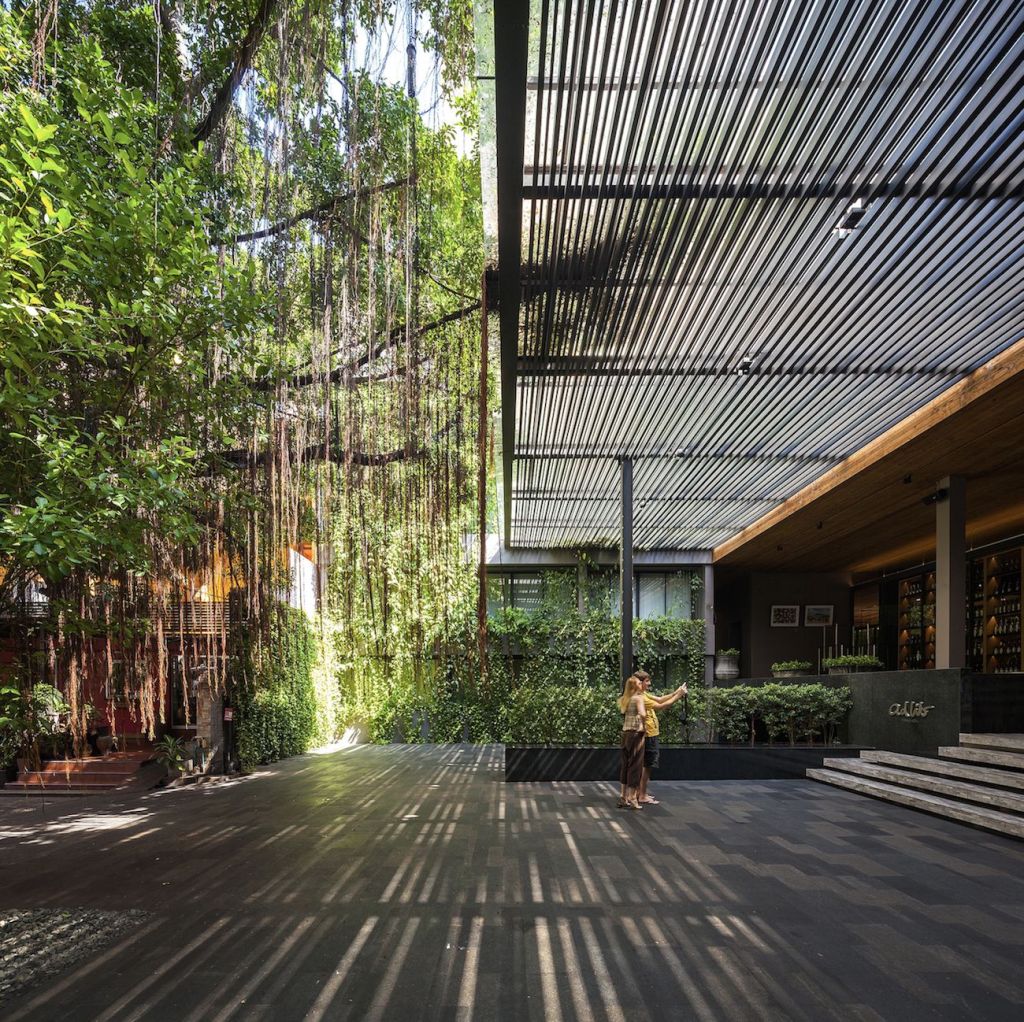
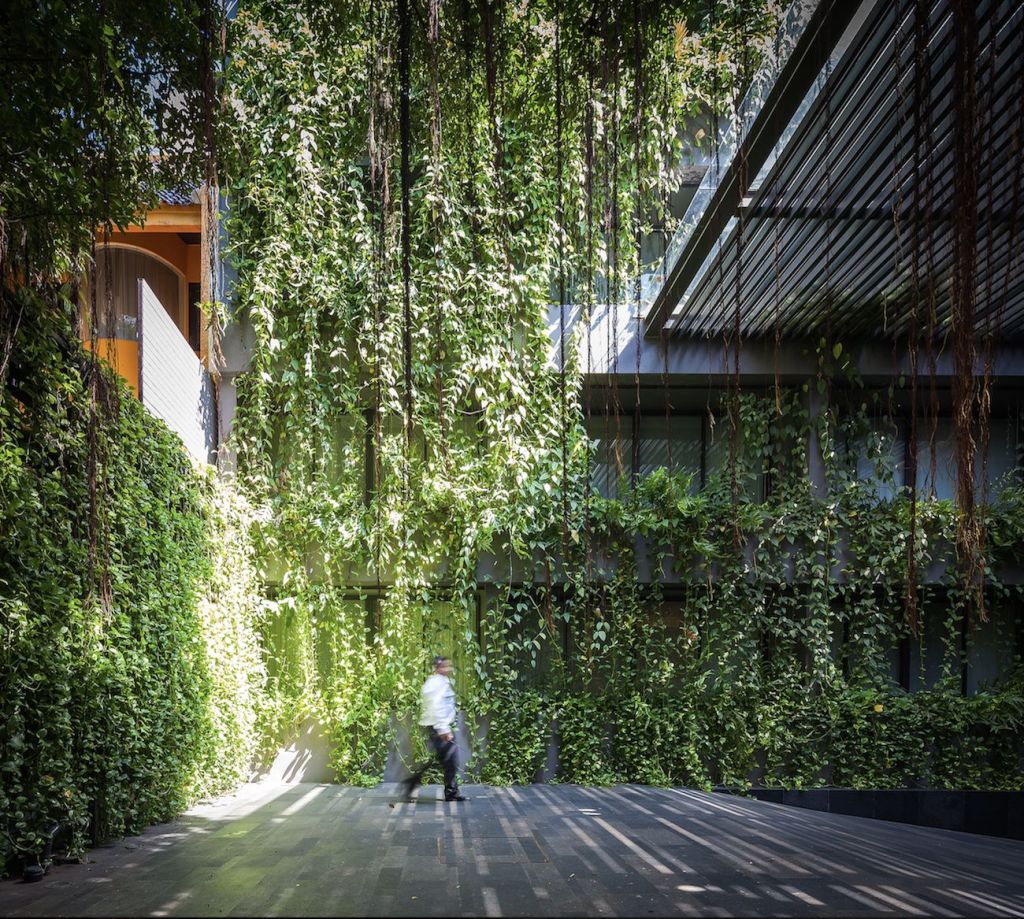
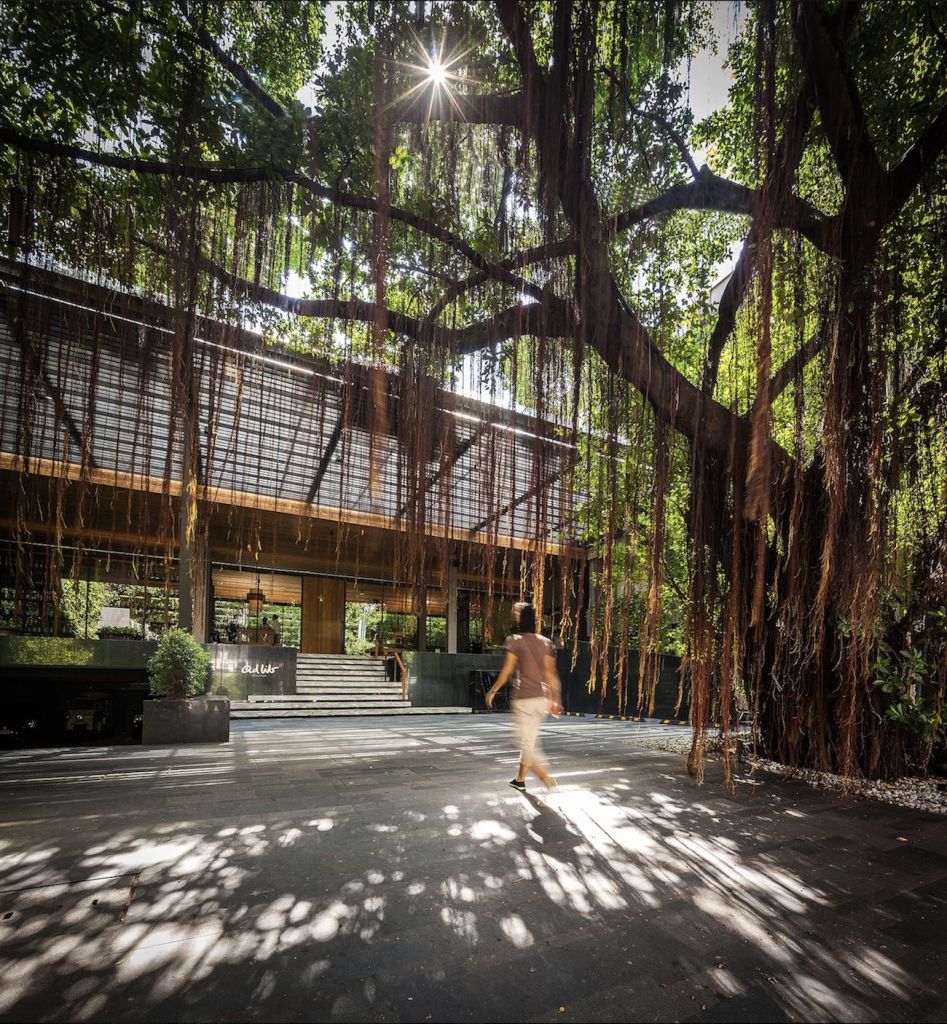


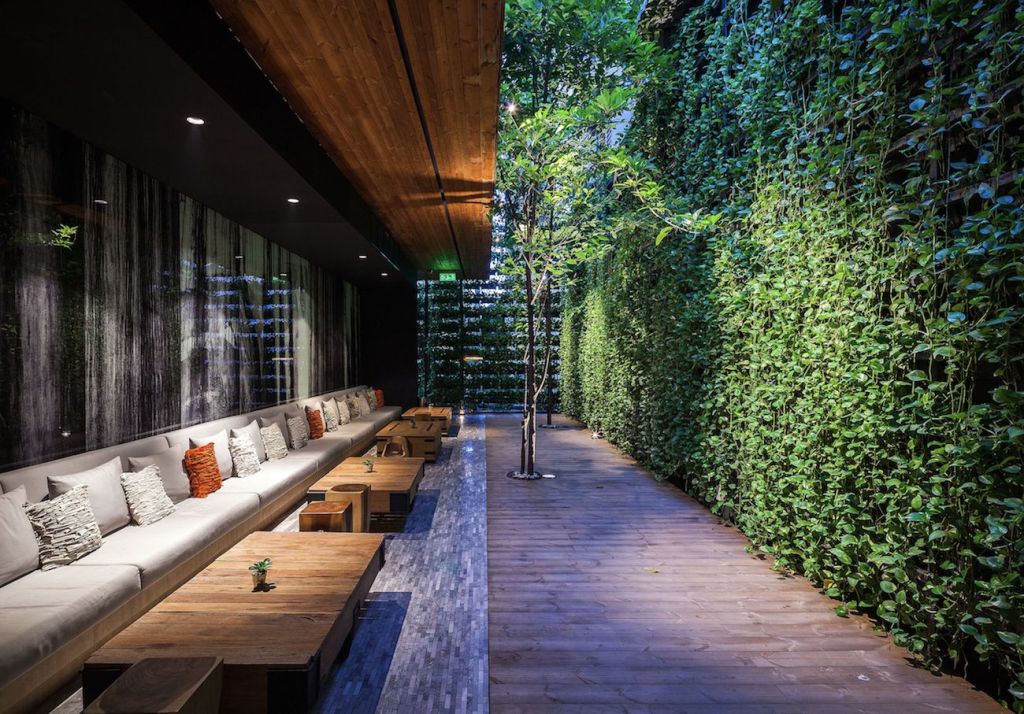

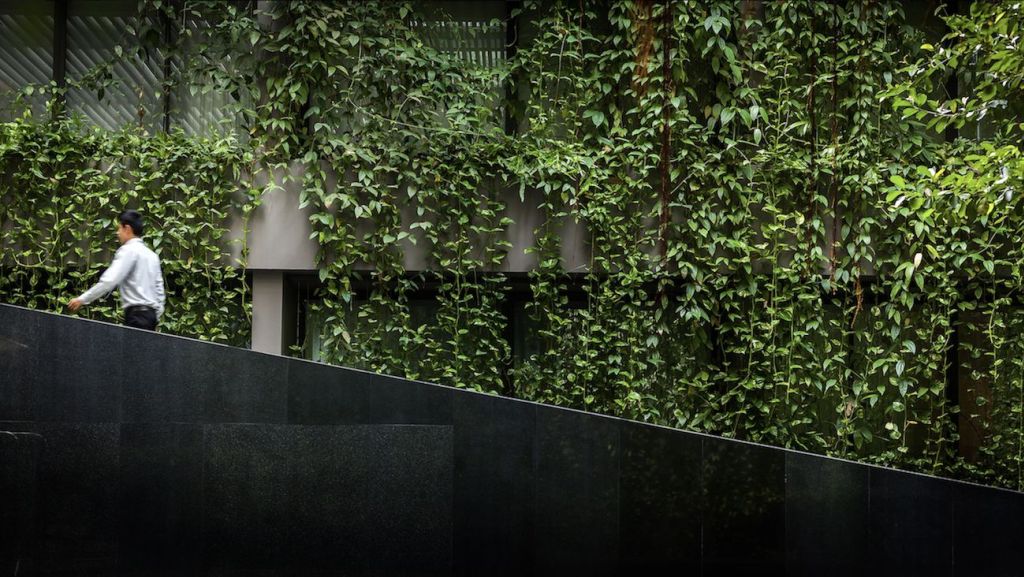




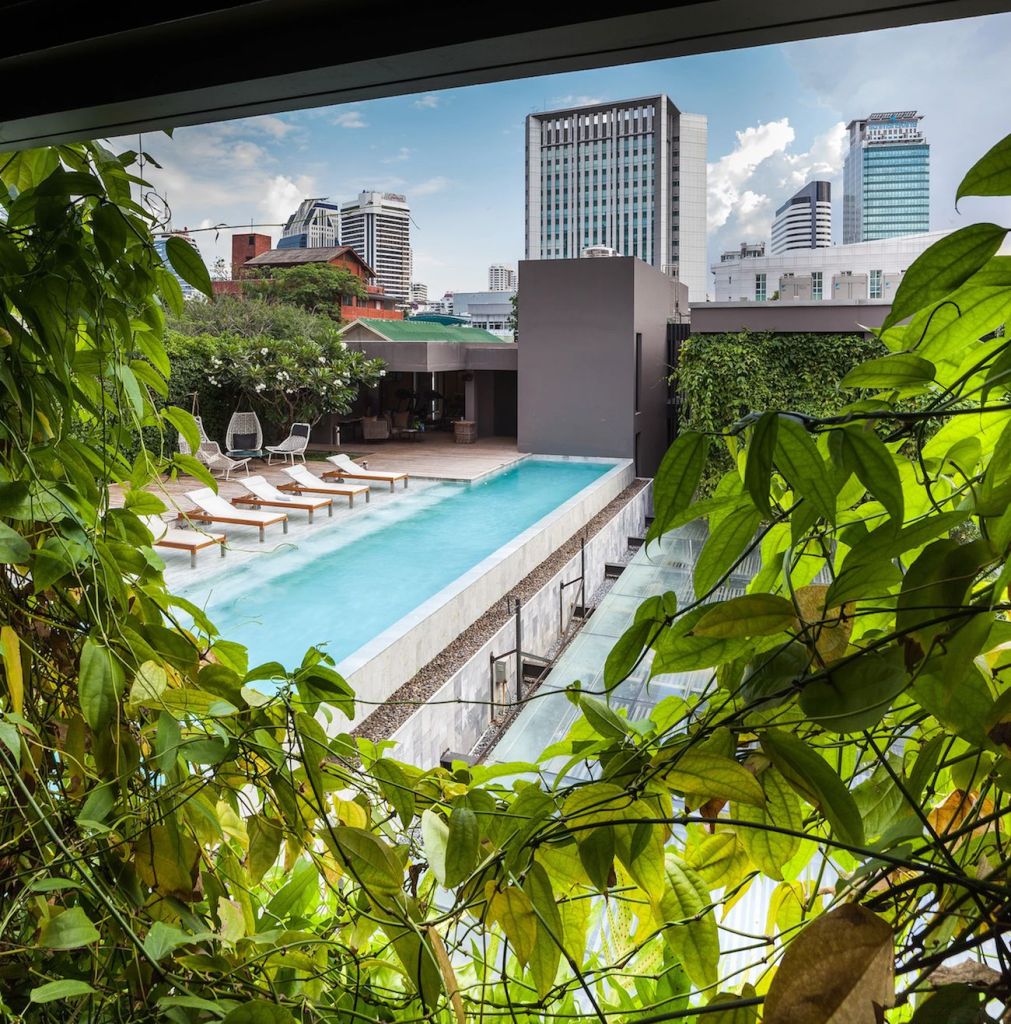
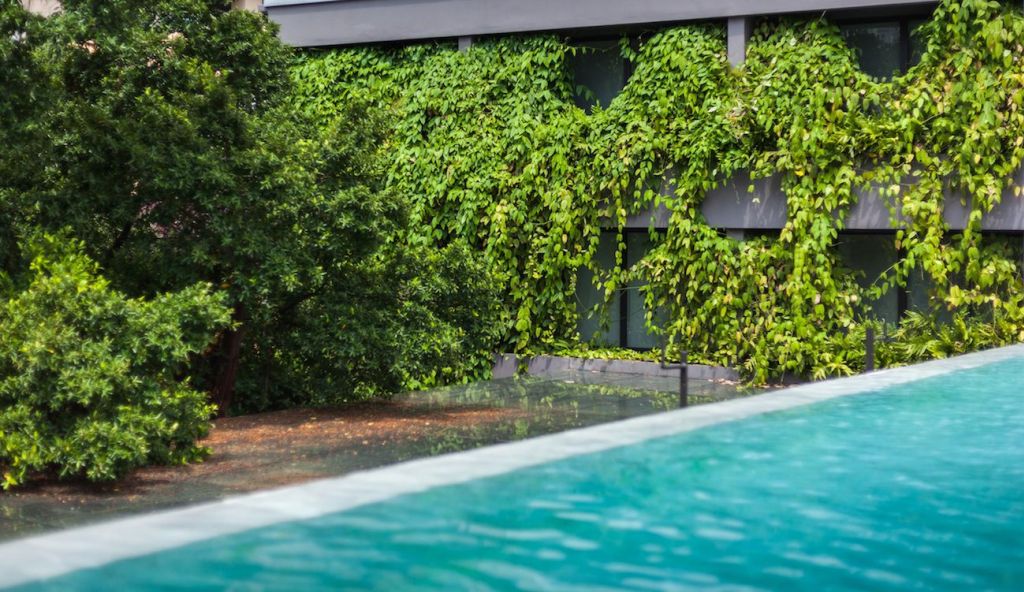



0 Comments